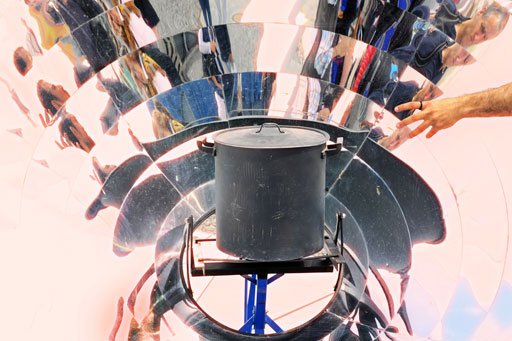
Wednesday, December 19, 2012
By Adnan Hussein

A solar cooking device is displayed at a technology fair in Argentina. Somalis are starting to take advantage of similar solar cookers as an alternative to using charcoal stoves. [DANIEL GARCIA/AFP]
Muna Abdikadir Muhiyadin, 27, said she brought about 50 solar cookers with her from Stockholm, Sweden, to sell in Mogadishu.
"Using solar energy to heat water or cook food is good for the environment and is great for fighting desertification [caused from] people cutting down trees and burning forests," she told Sabahi.
The solar cookers are made of several mirrored panels set together to look like a satellite dish. These panels focus sunlight at the centre of the appliance enabling it to heat a cooking pot or an oven.
Muhiyadin said some of her friends have also started businesses buying solar cookers from China and transporting them from Mogadishu to be sold in Borama, capital of Awdal region in north-western Somalia. She said they are thinking of bringing this service to other Somali towns and cities, including Hargeisa, Kismayo, Baidoa, Beledweyne and Bosaso.
The solar cookers can produce heat up to 200 degrees Celsius and can be used to prepare all types of foods, including vegetables, meat, chicken, fish, rice and bread, among others, Muhiyadin said.
"Prices vary based on demand and they offer various cooking methods, such as steaming and boiling," she said.
Somalis are starting to embrace the technology for use at home and in businesses.
Anab Daud, a resident of Mogadishu's Hamar Weyne district, said she has not been able to buy solar cooker because demand has outpaced supply.
"I am looking forward to buying one if they are on the market again because they are environmentally friendly and non-hazardous," she told Sabahi, adding that solar cookers are easier and faster to use.
"I saw my friend making food using a solar cooker," she said. "I used to see her kitchen fill with smoke and she would sweat profusely. It was hard for her to control the flame [using charcoal] so she could not control the amount of time it took her to cook the food."
Aweys Rage Siad, 56, who recently returned to Somalia from the United States, said he would like to see businessmen open cafes and restaurants using solar energy instead of polluting fuels.
"Using firewood in urban and rural areas has caused desertification and drought," he told Sabahi. "As a result, wild animals have fled the [once] green Somali forests for Kenya."
The Somali government and local administrations have worked to fight the practice of harvesting charcoal from Somali forests, as it causes the destruction of pasture for animals, increases the prevalence of floods, and makes the land unsuitable for agriculture. In addition, charcoal has been a major industry for al-Shabaab.
Lul Shire Abdi, an energy expert in Mogadishu, said Somali citizens should take advantage of solar energy or other alternative fuels, instead of chopping down trees and burning forests.
She told Sabahi that the energy emitted from the sun can also be harnessed using solar panels to operate pumps, fans, lighting, water heating and air conditioning.
"This is a good test to see if we can be self-sufficient and do without charcoal, oil, gas and other resources if solar energy is finally adopted," she said.